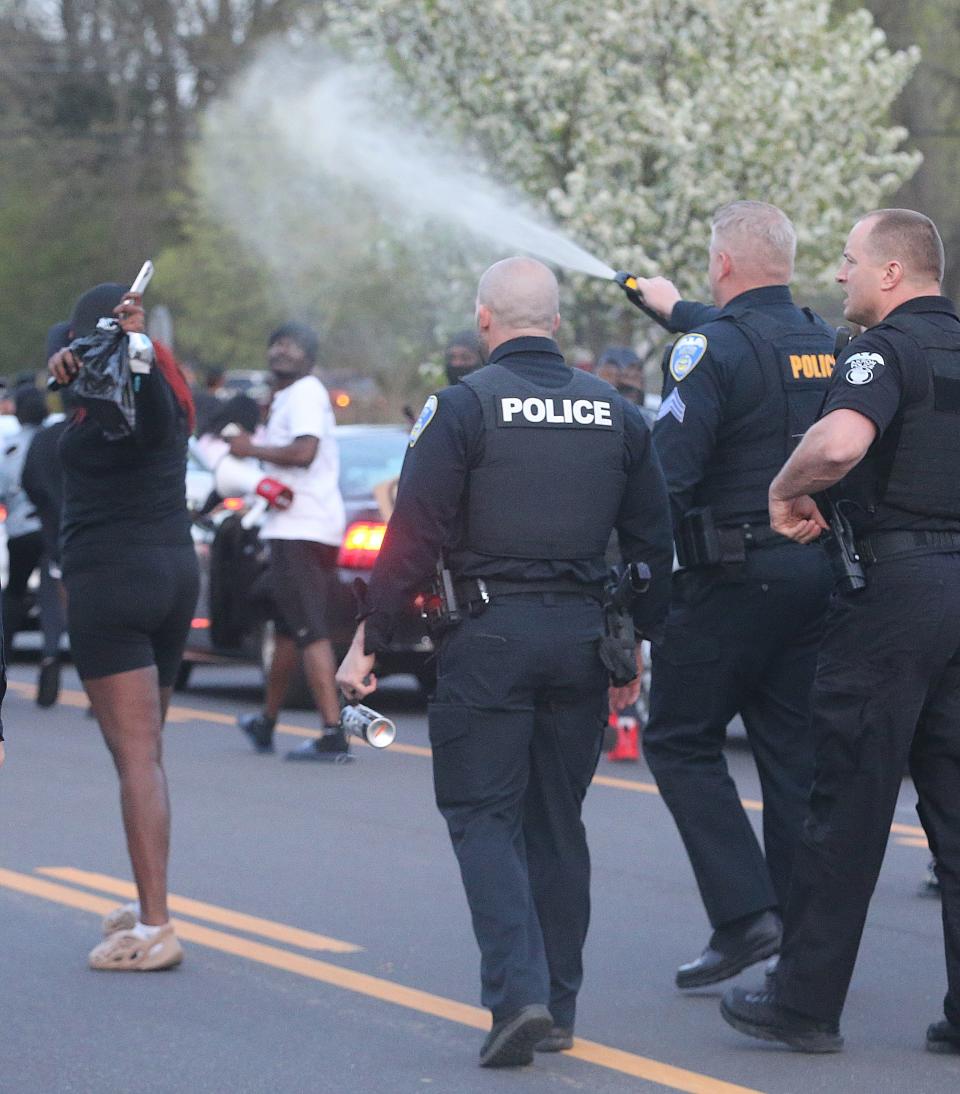'First Amendment speech has been chilled,' says attorney seeking injunction against Akron
The Akron Bail Fund, a nonprofit group that assists protesters, is seeking a federal injunction barring the city from continuing to employ use-of-force measures like tear gas and pepper spray against protesters.
The group filed a complaint and request for a temporary restraining order in U.S. District Court in Akron at midnight Friday. A telephone hearing between the attorneys for both sides and Magistrate Judge James Grimes was held at 3:30 p.m. Friday.
“What Akron should be doing is making sure it’s safe for protesters’ message to be heard — not threatening, retaliating and using force against them,” said Elizabeth Bonham, a Cleveland attorney representing the Akron Bail Fund.
During the hearing, Bonham said her client hoped to get an injunction to forbid the city from using weapons against protesters and stopping other measures that censor the protesters' right to free speech, including subjecting them to unlawful arrests and pushing them out of public areas.
Bonham said this step is being taken in response to police using tear gas, pepper spray and smoke bombs during a protest Wednesday in the Copley Road area. She said the Bail Fund is concerned that the use of chemical agents and other steps police are taking could have a chilling effect on the plans for continued protests of the grand jury’s decision on Monday not to indict the eight officers who fatally shot Jayland Walker.
"People's First Amendment speech has been chilled," Bonham said.
Stephanie Marsh, a spokeswoman for the city, declined Friday to comment on the injunction request.
"We don’t comment on pending litigation," she said.
The city, though, filed an objection to the request for an injunction in federal court, saying the Bail Fund lacked standing because it was complaining about past actions. Assistant Law Director Brian Bremer also said the city has a "significant government interest in safety and preventing the obstruction of traffic."
Bremer said the use of pepper spray on protesters who aren't responding to officers' orders is an "objectively reasonable use of force."
The Akron Bail Fund, which raised money to help cover the bonds of people arrested during protests last summer and whose members have participated in protests, said in a statement Friday that the group will “continue to speak out against police brutality and support those exercising their rights to free speech and assembly.”
“The city’s violence against protesters must end,” the group said.
Walker, 25, was shot more than 40 times by Akron officers after fleeing from police first in his car and then on foot. He was unarmed but state investigators determined that he fired a shot out of his car window while he fled. His gun was found on the seat of his car after the shooting.
After meeting for a week, a special grand jury in Summit County Common Pleas Court released a no-bill Monday in Walker’s shooting, which means the eight officers who shot and killed Walker last June won’t face criminal charges.
Protests follow grand jury's decision in Walker's shooting
Since the grand jury’s decision, several marches and protests have been held in Akron involving people voicing their disappointment with the decision and continued concern about Walker’s shooting.

Protesters on Wednesday in Akron were dispersed with tear gas and pepper spray by Akron police and Summit County sheriff's deputies. The gathering had been declared an unlawful assembly.
Wednesday protest in Akron: 'It just made matters worse.' Critics question police use of tear gas at Akron protest
Protesters said police acted without provocation, but police said Wednesday night that people were throwing objects before officers took action.
Bonham said her understanding is that none of the protesters were committing unlawful acts before police deployed chemical agents. She said she is continuing to gather information and review videos from the protest.
“Peaceful protests were ongoing,” she said. “The city decided they didn’t like it. That’s not something they can lawfully do.”
Akron chief discusses police response to protests
At a press conference on Monday, Akron Police Chief Steve Mylett explained the department's policy on disturbances: "So, in the event that we experience violence during a protest — people throwing rocks, bricks, smashing windows or assaulting other people or assaulting officers — we will declare that assembly an unlawful assembly."

He also said they would give people numerous chances to leave the protest area with instructions about where they can leave and how to get to the egress.
"At that point," Mylett said, "our hope is that everybody would comply. If people continue to engage in violent behavior, then we’ll use the tools and resources at our disposal to have people leave the area safely. Where arrests need to be made, we will make those arrests. But, again, our sincere hope is that we’re not going to experience that this time."
On Thursday, Mylett told the Beacon Journal he won't comment on how police handled the Copley Road protest until he's seen video from the Summit County Sheriff's Office and Ohio State Highway Patrol.
Mylett was expected on Friday to release a more detailed response to the criticism of the officers’ use of force. Instead, he said he couldn’t discuss details of the incident at this time.
“I am committed to getting accurate information to the public as soon as possible,” he said.
People arrested for protesting being sent to the Stark County Jail
One issue the Akron Bail Fund raised in its complaint is how the people arrested for protesting in Akron — so far about a dozen — are being sent to the Stark County Jail, rather than the Summit County Jail.
The complaint says keeping people at the Stark jail has lengthened the amount of time they are in custody.
Bonham said people have had to drive to Canton to give people who were arrested a ride home, which isn’t as convenient as going to Akron.
“What I’ve seen in past lawsuits is when you see prolonged detentions of people in conspicuous locations, this can mean the city is trying to keep people off the streets,” she said. “What you see here is people are far from the protests and we must expend more resources to find and support them.”
Eric Czetli, chief of staff for the Summit County Sheriff, said the people arrested for protesting are being sent to Stark because of the large number of inmates in the Summit County Jail awaiting trial.
In addition, Czetli said, a massive, two-year project to update the heating and air conditioning at the jail is creating additional space constraints as inmates are moved around to allow for the improvements.
Bail Fund seeks damages and attorney fees
Other issues raised by the Bail Fund in its complaint include:
The city closing government buildings to the public, barricading sidewalks, shutting streets and limiting where protesters may gather.
Police making unwarranted stops, searches, detention and arrests of protesters and towing protesters’ cars.
These actions, according to the complaint, violate protesters’ constitutional and civil rights.
The Bail Fund is seeking a temporary restraining order prohibiting the city from using chemical weapons and “other less lethal weapons” to quell peaceful protests and from using other measures that “unlawfully restrict constitutionally protected speech.”
The group is also requesting a permanent order forbidding the city from further violating protesters’ constitutional rights. The suit seeks damages “for physical and mental pain and suffering,” as well as punitive damages and attorney fees.
Cleveland attorney represents well-known activists arrested last summer in Akron
In addition to representing the Bail Fund, Bonham is among the attorneys for Jacob Blake Sr. and three other well-known national activists who were arrested in Akron last summer during protests of Walker’s shooting.
Blake's son was paralyzed in a police shooting in Wisconsin in 2020.
Blake’s trial in Akron Municipal Court resulted in a mistrial. City prosecutors say he will be retried.
More: Mistrial declared in well-known activist Jacob Blake Sr.'s trial related to Akron protest
Blake and the other well-known activists haven't returned to Akron to participate in any protests since the grand jury's decision was released.
ECF 1 Complaint by Lauren Young on Scribd
ECF 2 Motion for TRO by Lauren Young on Scribd
Stephanie Warsmith can be reached at swarsmith@thebeaconjournal.com, 330-996-3705 and on Twitter: @swarsmithabj.
This article originally appeared on Akron Beacon Journal: Injunction sought to stop use of force against Akron Walker protesters

